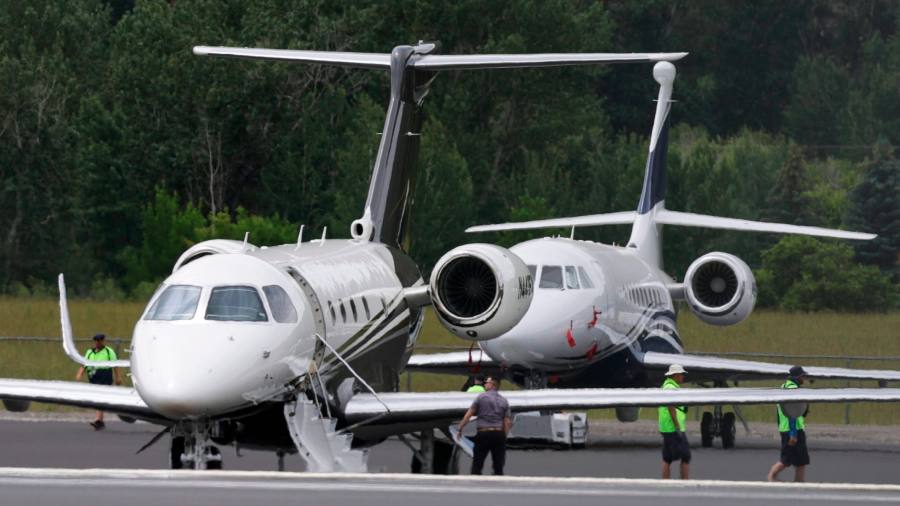Receive free Jetstar Airways Pty Ltd updates
We’ll send you a myFT Daily Digest email rounding up the latest Jetstar Airways Pty Ltd news every morning.
US corporate spending on jet travel has jumped for the second year in a row, highlighting how companies continue to spend on flying perks they insisted were needed during the Covid-19 pandemic.
Jet spending for chief executives at S&P 500 companies increased to $41.3mn last year, up 22 per cent from the year before and the highest amount in at least 10 years, according to data from ISS Corporate Solutions.
Facebook’s parent company Meta spent the most among S&P 500 companies for a CEO’s personal air travel, reporting $2.3mn on private flights for Mark Zuckerberg. But that was dwarfed by the more than $4mn Meta spent for Sheryl Sandberg, who stepped down as chief operating officer last year.
Anger over corporate jet spending has faded since bank and auto company executives were castigated for flying on private jets to Washington during the great financial crisis.
But the optics of big corporate jet travel could still prove tricky for executives, said Matteo Tonello, managing director at The Conference Board.
“With a growing debate about inequity, it can be a problem for a company if its leaders are displaying publicly their privilege,” he said. Such travel can also appear to clash with a company’s efforts to cut carbon emissions.
As Covid-19 enveloped the world in 2020, companies expanded private jet privileges, arguing that the higher spending was justified to avoid executives contracting the virus. Covid-19 infections continued to ripple across Europe in the winter of 2022 and again in the US spring.
Some companies have since scrapped their Covid flight policies. Exelon, a Chicago-based utility, said it had called time on expanded jet travel for executives and board directors in December. Its jet spending increased from $667,435 in 2021 for its CEO and two other executives to more than $1mn in 2022, regulatory disclosures show.
Insurance broker Arthur J Gallagher reported a Covid flight policy in 2022 and 2021, and dropped pandemic references from its regulatory filings this year. The company had said chartered aircraft should be used for business as well as personal travel “in light of travel safety concerns” stemming from Covid-19. Its jet spending for CEO Pat Gallagher and another executive shot up to $446,111 in 2022 from $76,304 the year before. A spokeswoman for Gallagher declined to comment.
Corporate spending on aircraft was relatively flat from 2011 to 2019, said Ramy Ibrahim at ICS. But since 2019, the S&P 500 companies have increased jet spending by 40 per cent.
“It stands to reason that the pandemic has something to do with it,” Ibrahim said.
Four companies spent more than $1mn on private jet travel for chief executives last year — Meta, Lockheed Martin, Netflix and Las Vegas Sands — versus two in 2021.
Defence contractor Lockheed spent $1.3mn on flights for chief executive James Taiclet, including commutes to his home out of state and “deadhead” flights — when an aircraft is used for a one-way charter. Lockheed spent $1.1mn on flights in 2021. Jet spending at Netflix and Las Vegas Sands increased 129 per cent and 46 per cent respectively.
This month, Netflix, which paid co-CEOs Reed Hastings and Ted Sarandos more than $50mn each, failed to win a majority of shareholder support for its executives’ pay, its second failed “say on pay” vote in as many years. The company’s share price plunged 51 per cent in 2022.
A spokesman for Netflix pointed to CEO pay changes the company announced this year, including a $3mn salary cap. Sarandos had received a $20mn salary for the past three years. Reed stepped down as co-CEO earlier this year.
Meta and Lockheed said they had no comment beyond regulatory disclosures. Exelon did not respond to requests for comment.
Securities and Exchange Commission rules generally require companies to report air travel by executives as part of their pay package.
Shareholders typically shrug off companies’ jet spending as a small portion of total executive pay. But big jet bills can trip up companies. ISS noted Accenture’s big jet spending for chief executive Julie Sweet in 2022, which more than doubled from the previous year. Shareholder support for executive pay at the consultancy this year dropped to its lowest level since 2011. Accenture did not respond to requests for comment.
Marian Macindoe, a corporate governance official at asset manager Parnassus, said the firm will include “excessive perks” when considering whether to vote against a company’s pay plan. Additionally, executives’ personal jet use “often runs contrary to [a] company’s climate goals”.
“We don’t necessarily support a directive to revert back to flying private at pre-Covid levels because the use and benefit of private jets is situational,” she said.
“However, reducing the use of corporate jets generally helps to reduce greenhouse gas emissions which supports climate action goals.”
Read the full article here




